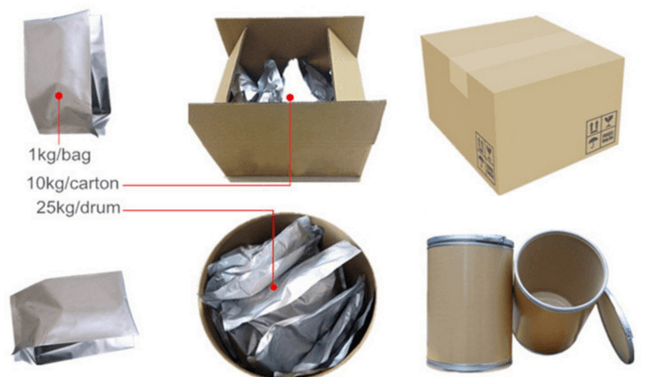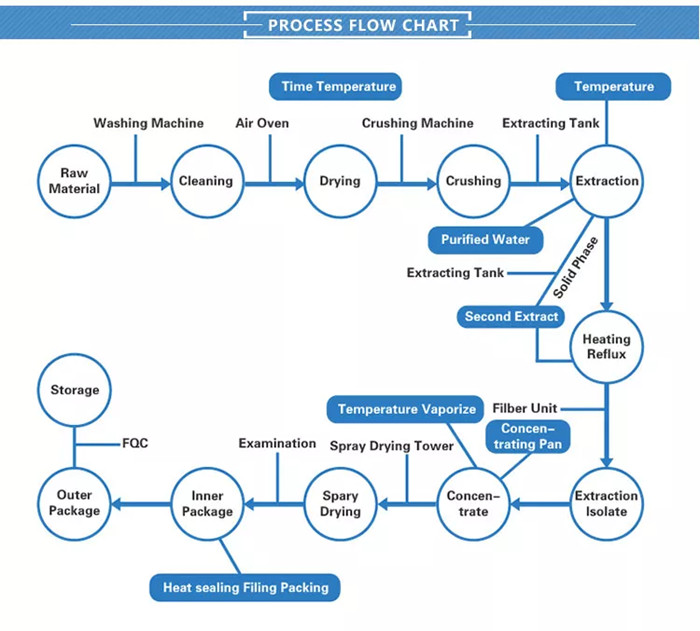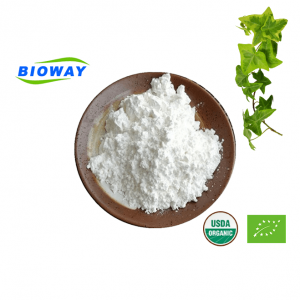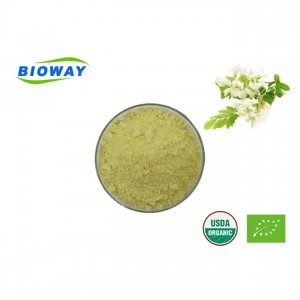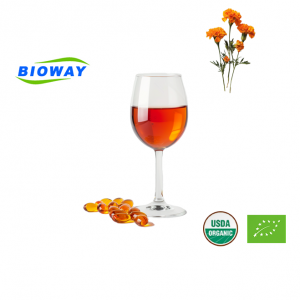High-purity Ginseng Extract Ginsenosides
Ginseng extract ginsenosides with a specification of up to 98% purity with each Ginseng saponin monomer refers to a highly concentrated form of the active compounds found in ginseng, known as ginsenosides. Ginsenosides are the key bioactive constituents responsible for many of the medicinal properties associated with ginseng.
When a ginseng extract is standardized to contain up to 98% purity with each Ginseng saponin monomer, it means that the extract has been carefully processed and concentrated to ensure that it contains a high percentage of ginsenosides, with each ginsenoside present at a specific level of purity. This level of standardization ensures the potency and consistency of the ginseng extract.
Ginseng saponin monomers refer to the individual ginsenosides present in the ginseng extract. There are several different ginsenosides, including Rb1, Rb2, Rc, Rd, Re, Rg1, Rg2, and others. These ginsenosides have unique biological activities and potential health benefits, allowing for a more targeted and potent formulation.
This high level of purity and standardization is important for ensuring the quality and effectiveness of ginseng extract products, particularly in the context of herbal supplements and traditional medicine. Contact us for more information: grace@biowaycn.com.
|
Product name |
Ginsenoside Rg3 20(S) CAS:14197-60-5 |
||
|
Batch no. |
RSZG-RG3-231015 |
Manu. date |
Oct. 15, 2023 |
|
Batch Quantity |
500g |
Expiry date |
Oct. 14, 2025 |
|
Storage condition |
Store with a seal at regular temperature |
Report date |
Oct. 15, 2023 |
|
Item |
Specification |
results |
| Purity (HPLC) |
Ginsenoside-Rg3 >98% |
98.30% |
|
Appearance |
Light-yellow to White Powder |
Conforms |
|
Flavor |
characteristics odor |
Conforms |
|
Physical characteristics |
|
|
|
Particle-size |
NLT100% 80mesh |
Conforms |
|
Weight loss |
≤2.0% |
0.3% |
| Heavy Metal |
|
|
|
Total metals |
≤10.0ppm |
Conforms |
|
Lead |
≤2.0ppm |
Conforms |
|
Mercury |
≤1.0ppm |
Conforms |
|
Cadmium |
≤0.5ppm |
Conforms |
| Microorganism |
|
|
|
Total number of bacteria |
≤1000cfu/g |
Conforms |
|
Yeast |
≤100cfu/g |
Conforms |
|
Escherichia coli |
Not included |
Not included |
|
Salmonella |
Not included |
Not included |
|
Staphylococcus |
Not included |
Not included |
Aside from the potential health benefits associated with ginsenosides, a ginseng extract with ginsenosides featuring a purity of up to 98% offers several other product features:
1. Standardization: The high purity of ginsenosides indicates that the ginseng extract has been carefully standardized to contain a consistent and potent level of active compounds. This ensures product quality and consistency from batch to batch.
2. Potency: The high purity of ginsenosides signifies a potent and concentrated form of ginseng extract, allowing for a more targeted and effective formulation.
3. Quality Assurance: The rigorous processing and purification methods used to achieve such high purity levels demonstrate a commitment to quality and purity in the manufacturing process.
4. Research and Development: Products with such high purity levels are often the result of advanced extraction and purification techniques, indicating a focus on research and development in the field of herbal medicine and natural products.
5. Formulation Flexibility: High-purity ginsenosides provide formulators with the flexibility to create a wide range of products, including dietary supplements, functional foods, and herbal remedies, with precise and consistent dosages.
6. Market Differentiation: Products featuring ginseng extract with ginsenosides at such high purity levels may stand out in the market due to their quality, potency, and potential for targeted health applications.
These product features highlight the technical and quality aspects of ginseng extract with high-purity ginsenosides, which can be important considerations for manufacturers, formulators, and consumers beyond the direct health benefits.
Ginseng has been studied for its health effects, including:
1. Gastric damage: Ginseng extracts have anti-inflammatory and antioxidative properties that can reduce gastric lesioning;
2. Immune response: Ginseng extracts can improve immune response to influenza vaccination;
3. Exercise performance: Ginseng extracts can enhance physical performance in competitive sports;
4. Stress: Ginseng may help support stress, overall mood, and brain function for memory and focus;
5. Blood sugar: Ginseng may help lower blood sugar in people with diabetes;
6. Cholesterol: Ginseng may help lower cholesterol levels;
7. Inflammation: Ginseng may help reduce inflammation;
8. Energy: Ginseng may help improve energy levels;
Here are the specific features of some ginseng saponin monomer:
1. Rb1: Supports cognitive function, anti-inflammatory properties, and potential stress reduction.
2. Rb2: May have antioxidant and anti-inflammatory effects, supporting cardiovascular health.
3. Rc: Known for potential anti-cancer properties and immune system modulation.
4. Rd: Exhibits potential anti-diabetic effects and supports liver health.
5. Re: Supports energy metabolism, cognitive function, and potential anti-inflammatory effects.
6. Rg1: Known for adaptogenic properties, potential anti-fatigue effects, and cognitive support.
7. Rg2: May have anti-inflammatory and anti-cancer properties, supporting immune function.
These specific features highlight the diverse potential health benefits associated with each ginseng saponin monomer, contributing to the overall therapeutic potential of the ginseng extract with high-purity ginsenosides.
Here's a comprehensive list of industries where it is commonly used:
1. Pharmaceutical Industry: Ginseng extract is used in traditional herbal medicines, dietary supplements, and pharmaceutical products targeting cognitive health, energy, and immune support.
2. Nutraceutical Industry: It is utilized in the production of nutraceuticals, functional foods, and health supplements aimed at promoting overall well-being, vitality, and stress management.
3. Cosmeceutical Industry: Ginseng extract is incorporated into skincare, hair care, and personal care products for its potential anti-aging, antioxidant, and skin-rejuvenating properties.
4. Food and Beverage Industry: It is used functional beverages, energy drinks, and health-focused food products to enhance nutritional value and offer potential health benefits.
5. Traditional Medicine: Ginseng extract is a key ingredient in traditional Chinese medicine, Korean medicine, and other traditional healing systems for its adaptogenic and tonic properties.
6. Research and Development: It serves as a subject of research and development in academic institutions, pharmaceutical companies, and natural product research organizations exploring its potential therapeutic applications.
7. Herbal Remedies: Ginseng extract is used in the preparation of herbal remedies, tinctures, and natural health products for various health conditions and wellness support.
8. Sports Nutrition: It is incorporated into sports nutrition products, pre-workout supplements, and recovery formulas for potential energy support and physical performance enhancement.
9. Animal Health: Ginseng extract is used in the formulation of animal health products, pet supplements, and veterinary medicines for potential immune support and vitality in animals.
These industries leverage the potential health benefits of ginseng extract with high-purity ginsenosides to develop a wide range of products catering to diverse consumer needs.
Packaging And Service
Packaging
* Delivery Time: Around 3-5 workdays after your payment.
* Package: In fiber drums with two plastic bags inside.
* Net Weight: 25kgs/drum,Gross Weight: 28kgs/Drum
* Drum Size & Volume: I.D.42cm × H52cm, 0.08 m³/ Drum
* Storage: Stored in a dry and cool place, keep away from strong light and heat.
* Shelf Life: Two years when properly stored.
Shipping
* DHL Express, FEDEX, and EMS for quantities less than 50KG, usually called as DDU service.
* Sea shipping for quantities over 500 kg; and air shipping is available for 50 kg above.
* For high-value products, please select air shipping and DHL express for safety.
* Please confirm if you can make the clearance when goods reach your customs before placing an order. For buyers from Mexico, Turkey, Italy, Romania, Russia, and other remote areas.
Payment And Delivery Methods
Express
Under 100kg, 3-5Days
Door to door service easy to pick up the goods
By Sea
Over300kg, Around 30 Days
Port to port service professional clearance broker needed
By Air
100kg-1000kg, 5-7Days
Airport to airport service professional clearance broker needed
Production Details (Flow Chart)
The production process for ginseng extract with ginsenosides featuring a purity of up to 98% involves several key steps:
1. Raw Material Selection: High-quality ginseng roots, typically from Panax ginseng or Panax quinquefolius, are carefully selected based on age, quality, and ginsenoside content.
2. Extraction: The ginseng roots undergo extraction using methods such as hot water extraction, ethanol extraction, or supercritical CO2 extraction to obtain a concentrated ginseng extract.
3. Purification: The crude extract undergoes purification processes such as filtration, solvent evaporation, and chromatography to isolate and concentrate the ginsenosides.
4. Standardization: The ginsenoside content is standardized to achieve a purity of up to 98%, ensuring consistent and potent levels of active compounds.
5. Quality Control: Rigorous testing and quality control measures are implemented to verify the purity, potency, and absence of contaminants in the final product.
6. Formulation: The high-purity ginsenosides are formulated into various product forms such as powders, capsules, or liquid extracts, often with excipients to enhance stability and bioavailability.
7. Packaging: The final ginseng extract with high-purity ginsenosides is packaged in airtight, light-resistant containers to maintain stability and shelf life.
This comprehensive production process ensures the high quality, potency, and purity of the ginseng extract, allowing for the development of products with potential health benefits.
Certification
High-purity Ginseng Extract Ginsenosides (HPLC≥98%) is certified by ISO, HALAL, and KOSHER certificates.
FAQ (Frequently Asked Questions)
Q: Who should not take ginseng?
A: While ginseng is generally considered safe for most people when taken in appropriate doses, there are certain individuals who should exercise caution or avoid taking ginseng. These include:
1. People with Bleeding Disorders: Ginseng can affect blood clotting and may increase the risk of bleeding, so individuals with bleeding disorders or those taking blood-thinning medications should consult a healthcare professional before using ginseng.
2. Individuals with Autoimmune Diseases: Ginseng may stimulate the immune system, so people with autoimmune conditions such as rheumatoid arthritis, lupus, or multiple sclerosis should consult a healthcare provider before using ginseng.
3. Pregnant or Breastfeeding Women: The safety of ginseng during pregnancy and breastfeeding has not been well studied, so it’s advisable for pregnant or nursing women to avoid ginseng unless under the guidance of a healthcare professional.
4. People with Hormone-Sensitive Conditions: Ginseng may have estrogen-like effects, so individuals with hormone-sensitive conditions such as breast, uterine, or ovarian cancer, or endometriosis should use ginseng with caution.
5. Individuals with Diabetes: Ginseng can affect blood sugar levels, so people with diabetes or hypoglycemia should monitor their blood sugar closely if using ginseng, and consult a healthcare provider for appropriate dosage adjustments.
6. People with Heart Conditions: Individuals with heart conditions or high blood pressure should use ginseng cautiously, as it may affect blood pressure and heart rate.
7. Children: Due to the lack of sufficient safety data, ginseng is not recommended for use in children unless under the guidance of a healthcare professional.
It’s important for individuals with underlying health conditions or those taking medications to consult a healthcare provider before using ginseng to ensure its safety and appropriateness for their specific health circumstances.
Q: Is ginseng and ashwagandha same?
A: Ginseng and ashwagandha are not the same; they are two distinct medicinal herbs with different botanical origins, active compounds, and traditional uses. Here are some key differences between ginseng and ashwagandha:
Botanical Origins:
- Ginseng typically refers to the roots of the Panax ginseng or Panax quinquefolius plants, which are native to East Asia and North America, respectively.
- Ashwagandha, also known as Withania somnifera, is a small shrub native to the Indian subcontinent.
Active Compounds:
- Ginseng contains a group of active compounds known as ginsenosides, which are believed to be responsible for many of its medicinal properties.
- Ashwagandha contains bioactive compounds such as withanolides, alkaloids, and other phytochemicals that contribute to its therapeutic effects.
Traditional Uses:
- Both ginseng and ashwagandha have been used in traditional medicine systems for their adaptogenic properties, which are believed to help the body cope with stress and promote overall well-being.
- Ginseng has been traditionally used in East Asian medicine for its potential to enhance vitality, cognitive function, and immune support.
- Ashwagandha has been traditionally used in Ayurvedic medicine for its potential to support stress management, energy, and cognitive health.
While both ginseng and ashwagandha are valued for their potential health benefits, they are distinct herbs with unique properties and traditional uses. It’s important to consult a healthcare professional before using either herb, especially if you have underlying health conditions or are taking medications.
Q: Does ginseng have negative effects?
A: While ginseng is generally considered safe for most people when used appropriately, it can potentially cause negative effects in some individuals, especially when consumed in high doses or for extended periods. Some potential negative effects of ginseng may include:
1. Insomnia: Ginseng is known for its potential to increase energy and alertness, and in some cases, it may lead to difficulty falling asleep or staying asleep, especially if taken in the evening.
2. Digestive Issues: Some individuals may experience digestive discomfort, such as nausea, diarrhea, or stomach upset, when taking ginseng supplements.
3. Headaches and Dizziness: In some cases, ginseng may cause headaches, dizziness, or lightheadedness, particularly when used in high doses.
4. Allergic Reactions: Rarely, individuals may experience allergic reactions to ginseng, which can manifest as skin rashes, itching, or difficulty breathing.
5. Blood Pressure and Heart Rate Changes: Ginseng may affect blood pressure and heart rate, so individuals with heart conditions or high blood pressure should use it cautiously.
6. Hormonal Effects: Ginseng may have estrogen-like effects, so individuals with hormone-sensitive conditions should use it with caution.
7. Interactions with Medications: Ginseng can interact with certain medications, including blood thinners, diabetes medications, and stimulant drugs, potentially leading to adverse effects.
It’s important to note that individual responses to ginseng can vary, and the potential negative effects may depend on factors such as dosage, duration of use, and individual health status. As with any herbal supplement, it’s advisable to consult a healthcare professional before using ginseng, especially if you have underlying health conditions or are taking medications.







